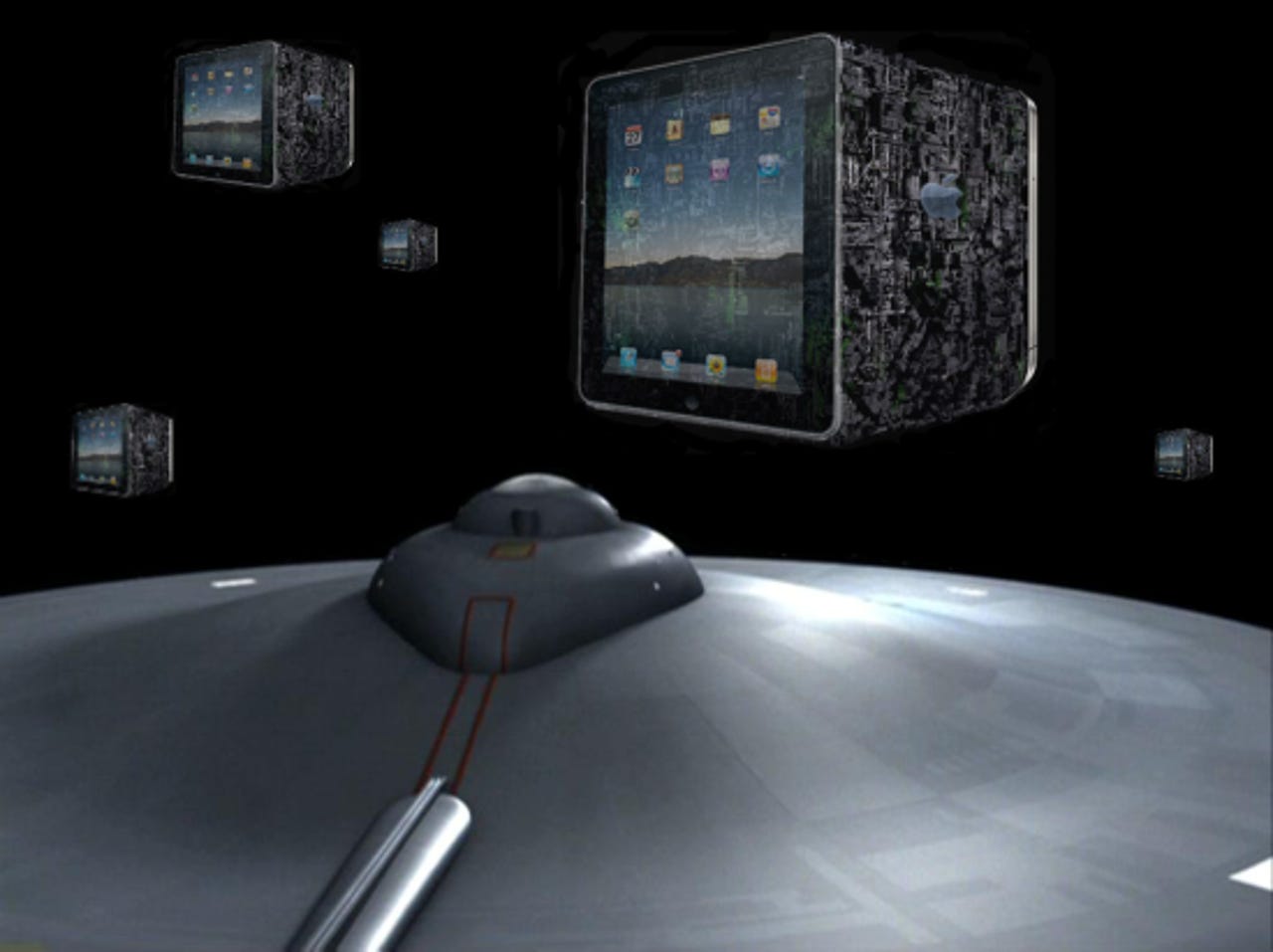How Apple could disrupt the Enterprise

The other day, I had the pleasure of speaking with Greg Kostello, President and CEO of givit.com, a private video sharing service (think YouTube, only secure) and our discussion diverted from givit to Apple. We talked about Apple in the Enterprise and how it seems that BYOD could usher in a whole new age of corporate technology. We talked about how reluctant IT personnel are to embrace BYOD until a CXO walks into the IT cubicle farm with an iPad that he wants to connect to the corporate network. Then everything changes. Greg suggested that if Apple really wanted to take over the Enterprise, all they would have to do is to hand out iPhones or iPads to C-level executives at a place like CES.
"What a great idea," I said with excitement and thoughts of stealing it as my own. I reluctantly admitted to Greg that I would give him credit for it and I do so now, begrudgingly.
But, I won't argue over who thought of what or who said this or that. The point is a good one. Apple could disrupt and takeover the Enterprise by handing out free iPhones, iPods and iPads to CXOs.
Why would that work, you ask? Simple. With certain technology shifts, you convert from the bottom and others you convert from the top. If BYOD isn't working by converting a company's user base, then you'll have to convert the leadership.
Company leaders get things done.
For example, if your company has a no BYOD policy, that means that no one can bring in their own device to use on the network. No personal laptops. No personal phones. No personal tablets. However, when a C-level executive wants to use her personal tablet on the network, you'll configure it for her without question. Quoting company policy to someone who probably wrote the company policy is not a good idea--career-wise, but you handle it like you think you should. Don't say I didn't warn you.
You, wisely, help her connect her tablet to the network and walk away.
A few days later, another executive or manager comes to you for the same purpose. Pretty soon, company policy has changed and now BYOD is standard fare.
But, wait. How did you know how to connect the original executive's tablet to the network? Oh, that's right, I forgot, those of us in IT are really immune from silly company policy. We can do whatever we want because, well, we can. We tell everyone else, "No," but take liberties for ourselves. That's just the way it works. Just like the, "No Facebook," "No Twitter," and "No personal email" rules that we ignore. That just doesn't apply to us.
Now, instead of saying, "No," to such requests, you have to do it for everyone or publish an Intranet How-To for anyone who wants to bring their own device.
If Apple were to hand out iGadgets at a conference, you'd see the BYOD shift taking place at a very high pace. It's going to happen anyway but might require two to three years to have the same reach as a "giveaway" episode that I'm describing.
So, what will happen if Apple does indeed disrupt the Enterprise with its technology? My crystal ball says that Apple products will become the ultimate remote clients.
Ultimate remote clients?
Yes, ultimate remote clients.
BYOD will usher in another Enterprise shift: The shift toward a data-centered Enterprise. No longer will companies have to worry about desktop hardware. Your company will provide services, such as remote/virtual desktops, storage, client Apps where appropriate and access. It will be up to you how you connect in to do your work. That's a tremendous burden off of company shoulders.
The company's burden is to provide you with a pathway in and services with which to work. The only difference in then and now is that you'll own the computer. For the most part, no changes will have to be made to your device.
Done correctly, the scenario is very simple.
You'll use your device to connect to a secure VPN. Apple devices come standard with a Cisco VPN client under Settings, VPN. You can configure your VPN to prompt you for a connection password. Then you'll connect to a virtual desktop using an App. For example, using an RDP or Citrix Receiver App. No passwords are stored on the device. Active Directory controls your logon credentials and your access to resources, just as if you were on the corporate network.
Once your device connects to the VPN, you have access to resources via Apps or through your virtual desktop computer. Problem solved. No corporate data ever stays on the local device. No virus or malware transmission is possible. No saved passwords. No device lockdown. No hindrances to the user device or the corporate network. Everything works as it always has.
The company IT department will manage user access through an AD-integrated management (MDM) program. Sure, you'll still have Windows virtual desktops and Windows servers but the traditional Windows desktop is about to die a quick and timely death. Everything in the data center. Everything managed from the data center.
I think that over the next couple of years, Apple products will disrupt the "desktop" and push Windows out of the way as the ultimate remote client. Windows has had a good run for the past 20+ years on the desktop but that time is about to come to a halt in favor of a more user-oriented, user-owned magic device: The ultimate remote client.
To speed things up, Apple could give away its hardware to company decision-makers.
And, that, my friends, is how Apple could disrupt the Enterprise.
See Also:
Wintel: beginning of the end or end of the beginning?
OnLive Desktop app now available from iTunes App store
Appleization and the Apple-centered Appleprise
Apple's iOS cited as the most popular mobile OS for enterprise
